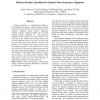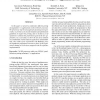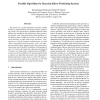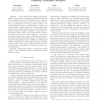115
Voted
ICPP
2007
IEEE
15 years 8 months ago
2007
IEEE
Sequence alignment is a fundamental problem in the computational biology. Many alignment methods have been proposed in the literature, such as pair-wise sequence alignment (2SA), ...
136
Voted
ICPP
2007
IEEE
15 years 8 months ago
2007
IEEE
In this paper, we present a heuristic algorithm that improves the performance of static task scheduling. Our algorithm is based on the list-scheduling mechanism. For the listing p...
125
Voted
ICPP
2007
IEEE
15 years 8 months ago
2007
IEEE
Performance and power are critical design constraints in today’s high-end computing systems. Reducing power consumption without impacting system performance is a challenge for t...
133
Voted
ICPP
2007
IEEE
15 years 8 months ago
2007
IEEE
This paper presents COBRA (Continuous Binary ReAdaptation), a runtime binary optimization framework, for multithreaded applications. It is currently implemented on Itanium 2 based...
108
Voted
ICPP
2007
IEEE
15 years 8 months ago
2007
IEEE
Program parallelization requires mapping computation and data to processing elements. Navigational Programming (NavP), based on the principle of migrating computations, offers a d...
108
Voted
ICPP
2007
IEEE
15 years 8 months ago
2007
IEEE
In this paper we present a solution for efficient porting of sequential C++ applications on the Cell B.E. processor. We present our step-by-step approach, focusing on its general...
125
Voted
ICPP
2007
IEEE
15 years 8 months ago
2007
IEEE
— Most of existing search algorithms for unstructured peer-to-peer (P2P) systems share one common approach: the requesting node sends out a query and the query message is repeate...
119
Voted
ICPP
2007
IEEE
15 years 8 months ago
2007
IEEE
We present two parallel algorithms and their Unified Parallel C implementations for Bayesian indoor positioning systems. Our approaches are founded on Markov Chain Monte Carlo si...
88
Voted
ICPP
2007
IEEE
15 years 8 months ago
2007
IEEE
A flooding-based search mechanism is often used in unstructured P2P systems. Although a flooding-based search mechanism is simple and easy to implement, it is vulnerable to overla...
100
Voted
ICPP
2007
IEEE
15 years 8 months ago
2007
IEEE





